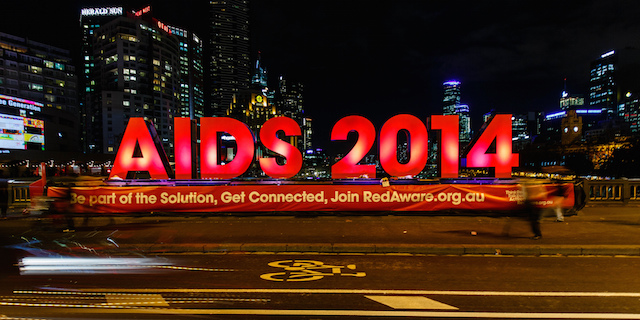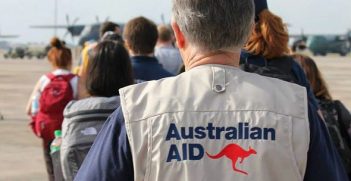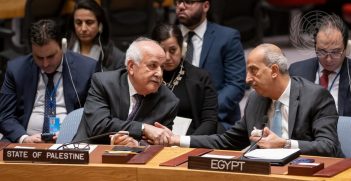AIDS and Human Security

To coincide with World Aids Day, Professorial Fellow Dennis Altman reflects upon the global impact of AIDS and Australia’s response to this human security concern.
Over the past year the world has been confronted with grim reminders of a number of non-traditional threats to global security, which together make up what is commonly referred to as human security. As the United Nations Fund for Human Security has pointed out “[s]ince the end of the Cold War, we have witnessed the lives of millions of people being threatened not only by international war and internal conflicts but also by chronic and persistent poverty, climate-related disasters, organised crime, human trafficking, health pandemics, and sudden economic and financial downturns.”
The Abbott Government has responded enthusiastically to the challenges of fighting trafficking and terrorism, although whether military commitments against ISL are the most effective means of countering fundamentalist thugs remains problematic.
On the other two dominant human security issues of the year—climate change and Ebola—Australia’s response has been far less significant. Despite Abbott’s fondness for “the Anglosphere” no Australian government since Whitlam’s has seemed so out of step with the United States and Great Britain. President Obama made clear his distance from Australia on climate change during his recent visit, and the British Conservative government has increased spending in the two areas, international development and climate change, most downgraded by our government.
The Ebola epidemic is a reminder that infectious diseases can threaten economic growth and ultimately global security. Yet Ebola is killing far fewer people each day than is HIV; the death toll from AIDS remans 3000 a day on even optimistic estimates. During the 2000s HIV therapies started to be rolled out in many parts of the world, confounding those who said they could not be made available to people in poor countries. Yet while strides have been made it remains true that most people infected with HIV globally do not know their status, and only about a third of people who are infected receive any form of effective treatment.
6000 people a day are probably infected with HIV, almost all in low and middle income countries and almost 70% of them in Africa. Yet the fastest growing epidemics are probably amongst men who have sex with men and amongst needle users, many of them in the Indo-Pacific region. There are alarming reports of increasing infections from areas of internal warfare stretching from Afghanistan to Libya, and infections are still rising in parts of Indonesia, Papua New Guinea and the Philippines. Unlike Australia, where there is also a rise, these countries lack the resources to roll out the full range of potential therapies and preventive measures.
The AIDS epidemic is not over, yet tragically as we have better tools to prevent and treat AIDS, international interest and resources are not rising to keep pace. In part this is because most of us in rich countries like Australia believe the crisis is over; AIDS is no longer a global emergency, but rather an ongoing problem amongst many. Despite huge efforts there is neither a cure nor a vaccine for HIV, and the global rate of infection well outnumbers those who are placed on treatment.
Earlier this year Melbourne hosted the International AIDS Conference, which was an opportunity both to reflect on the local epidemic and to scale up responses globally. The former was remarkably successful, and coincided with a new national strategy with ambitious targets as well as some changes in laws that have hindered effective responses to HIV. The latter was less so.
Australia has been a funder for HIV projects, especially in our region, since the beginning of the epidemic, and was one of the first to acknowledge the need to work closely with vulnerable populations who, in the Asia/Pacific region, are largely men who have sex with men, injecting drug users and sex workers. Other than in Papua New Guinea the HIV epidemic in our part of the world is closely linked to behaviours that are deeply stigmatised, which often prevents resources for information and prevention being directed to those who need it most.
The increasingly global efforts to fight AIDS are coordinated through the Global Fund to Fight AIDS, Tuberculosis and Malaria, a public private partnership established in 2002 as a result of pressure from people like Kofi Annan and Bill Gates. The Fund supports programs against all three diseases globally, and has been important in seeking inclusion of those most affected by the diseases. Australia is a respectable but not particularly generous donor; we give far less than Canada, Norway and Spain, and about the same as Denmark, whose population is a third of ours.
The Global Fund is a product of a period in the early 2000s when AIDS became a major international priority. At that point there were growing concerns about the impact of AIDS on global security, and dire forecasts that we were facing a global pandemic, leading to a resolution by the Security Council in 2000; the first special meeting on AIDS of the UN General Assembly in 2001; and the initiation by President George W Bush of major funding for international AIDS programs (PEPFAR), arguably his most lasting legacy.
The 2005 Gleneagles G8 meeting was probably the high point of international mobilisation around AIDS. The British host, Tony Blair, backed by Presidents George W Bush and Jacques Chirac, was determined to highlight aid to Africa, which included a strong emphasis on HIV. But Gleneagles also followed a massive popular mobilisation, through the Make Poverty History. A decade later, the Millennium Development Goals, also a product of that time, are being reviewed by a complex global dialogue, now moving towards resolution.
The current Millennium Development Goals make specific reference to AIDS, along with malaria and tuberculosis, and UNAIDS, the lead agency involved, is asking for an explicit commitment to end AIDS by 2030: “[a] prominent position for AIDS in the next development framework is in the interest of all countries: as a public health priority in many countries and as a potential pathfinder, strategic partner and catalyst for more inclusive, gender-transformative and rights-based action, which puts people at the centre of development.”
It is not yet certain that the new sustainable development goals will refer to AIDS, or indeed to any specific disease, but this does not mean the struggle to contain AIDS is over. There are economic as well as major humanitarian gains to scaling up the global response to the HIV epidemic. The Abbott Government has declared a particular interest in medical research and international health. The combination of the International AIDS Conference followed by a G20 summit was an opportunity for Australia to take the lead in reaffirming and funding an effective global response to what remains a major threat in some of the poorest countries in the world. As with other issues of human security it was a moment not seized.
Dennis Altman AM is a Professorial Fellow in the Institute for Human Security and Social Change, LaTrobe University.





